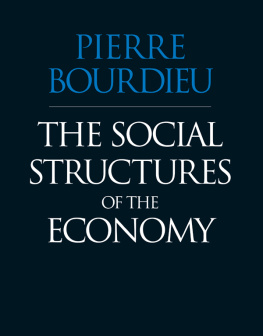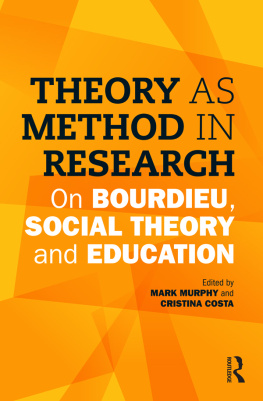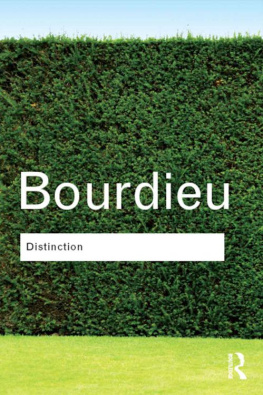The Work of Pierre Bourdieu
The Work of Pierre Bourdieu
Recognizing society
Derek Robbins
First published 1991 by Westview Press
Published 2019 by Routledge
52 Vanderbilt Avenue, New York, NY 10017
2 Park Square, Milton Park, Abingdon, Oxon OX14 4RN
Routledge is an imprint of the Taylor & Francis Group, an informa business
Copyright Derek Robbins 1991
All rights reserved. No part of this book may be reprinted or reproduced or utilised in any form or by any electronic, mechanical, or other means, now known or hereafter invented, including photocopying and recording, or in any information storage or retrieval system, without permission in writing from the publishers.
Notice:
Product or corporate names may be trademarks or registered trademarks, and are used only for identification and explanation without intent to infringe.
Library of Congress Cataloging-in-Publication Data
Robbins, Derek
The Work of Pierre Bourdieu/Derek Robbins.
p. cm.
Includes bibliographical references (p. ) and index.
ISBN 0-8133-1350-3 (HC)ISBN 0-8133-1351-1 (PB)
1. Bourdieu, Pierre. 2. Sociology FranceHistory.
3. SociologyMethodology. I. Title.
HM22.F8B77 1991
301'.01dc20 91-14074
CIP
Typeset in Singapore
ISBN 13: 978-0-367-27383-5 (hbk)
For Diana, Oliver and Felix
The development of my work on Bourdieu was made possible by a grant under the Economic and Social Research Council/Centre National de la Recherche Scientifique Exchange Scheme for Social Scientists during 1986-7. My host institution in two visits during that year was the Institut de l'Histoire du Temps Prsent, and I am grateful to Michael Pollak for introducing me to members of the Centre de Sociologie Europeenne and inviting me to the inaugural meeting of the Societe Frangaise pour l'Histoire des Sciences de l'Homme. Within the Centre, it was Monique de Saint Martin and Yvette Delsaut who encouraged me, first of all, to embark on a preliminary analysis of the reception of Bourdieu's work in England before proceeding to this full study, and both were generous in their support. Since 1986, I have been greatly indebted to Yvette Delsaut who has always found time to talk with me and to provide me with up-to-date information. Since my first meeting with him in October 1986, Pierre Bourdieu himself has actively encouraged my work and I have enormously appreciated the occasions on which I have been able to discuss various projects, including this book, with him.
I have only been able to undertake the research necessary to write this book with the practical assistance of the librarians at the Polytechnic of East London and I am especially grateful to Harbans Chahal and Robin Stinson at the Livingstone House library and to Valerie Pearn at the Holbrook library. The Pro-Rector, Academic, at the Polytechnic of East London - Professor Les Allen - has offered encouragement and I have benefited from discussions with my colleagues in the Group for Research into Access and Student Programmes (GRASP) within the School for Independent Study - Phil Bradbury, John Cocking, Dr. Maggie Humm, Dave O'Reilly and Steve Brindle. I have also appreciated the interest which has been shown in my work by staff and students in the Departments of Sociology and of Cultural Studies within the Polytechnic and, in particular, by Professor Michael Rustin, Dr. Mike Smee and Catherine Hall.
I should like, finally, to acknowledge the advicc and assistance given to me by John Skelton of the Open University Press.
Vous savez, quand j'cris, je crains beaucoup de choses, c'est--dire beaucoup de mauvaises lectures. Ce qui explique, on me le reproche souvent, la complexit de certaines de mes phrases. j'essaie de decourager l'avance Ies mauvaises lectur es que je puis souvent prvoir. Mais les mises en garde que je glisse dans une parenthese, un adjectif, des guillemets, etc., ne touchent que ceux qui n'en ont pas besoin. Et chacun retient, dans une analyse complexe, le cote qui le drang e le moins.
You know, when I write, I dread lots of things that is lots of bad readings. This explains the thing for which I am often reproached the complexity of some of my phrases. I try to discourage in advance the bad readings which I can often foresee. But the cautions which I slip into a parenthesis, an adjective, or in inverted commas, etc., only register with those people who don't need them. In a complex analysis, people retain the aspect which disturbs them least.
Pierre Bourdieu. (From a conversation with Didier Eribon published in Libration (3 and 4 November 1979), and reproduced in Questions de sociologie (Paris, Editions de Minuit, 1980), p. 14.)
The scope for misreading Bourdieu by reading him through an introduction is enormous and fills me with dread. This is why it must be said in a preface that this book is intended to guide readers towards and through the original texts many of which are now rapidly becoming available in translation. This introduction to Bourdieu's work tries to condense arguments which have been densely expressed in the numerous books and articles which he has written since his first main publication of 1958. I foll ow Bourdieu's career in chronological order and, hence, the following brief summary of that career offers a quick overview both of the career and of the structure of this book. A full bibliography is given as an appendix.
Born in the Bam in 1930, Bourdieu studied at the cole Normale Suprieure in Paris. He undertook ethnographic researches in Algeria during the War of Algerian Independence, publishing Sociologie de I'Algrie in 1958 and Travail et travailleurs en Algrie and Le D racinement, la crise de l'agriculture traditionelle en Alg rie in 1963 and 1964 respectively ( offers, in summary, some ways of recognizing Bourdieu's work which suggest, finally, that it should be seen to be a consciously self-limiting paradigm of the process by which we should all endeavour (similarly self-limitingly) to recognize our society.
1
Introduction
I caught this morning morning's minion, kingdom
of daylight's dauphin, dapple-dawn-drawn Falcon, in
his riding
Of the rolling level underneath him steady air, and striding
High there, how he rung upon the rein of a wimpling wing
In his ecstasy! then off, off forth on swing,
As a skate's heel sweeps smooth on a bow-bend: the hurl and
gliding
Rebuffed the big wind. My heart in hiding
Stirred for a bird, the achieve of, the mastery of the thing!
Gerard Manley Hopkins.
Hopkins did not simply see a falcon, nor did he simply describe what he had more than seen. He 'caught' the being-in-action of the bird and sought to re-present its presence and its motion in sounds rhymes, alliterations and rhythms which are more than mere denotative words. Hopkins developed the technique of'sprung rhythm' in order to re-enact the 'inscape' of the observed object. 'Mastery' 'matrise' is one of Bourdieu's favourite words. He has tried to avoid 'fixing' society, nailing it down to any limited conception or perception, and has tried to catch the practical mastery which people possess of their situations to represent the immanent dynamics of the decisions which people actually make within society. In spite of the heavy intellectuality of much of his writing which might suggest a preoccupation with knowledge and thought, Bourdieu's main interest from his earliest work to the present has been in human relations in action.











